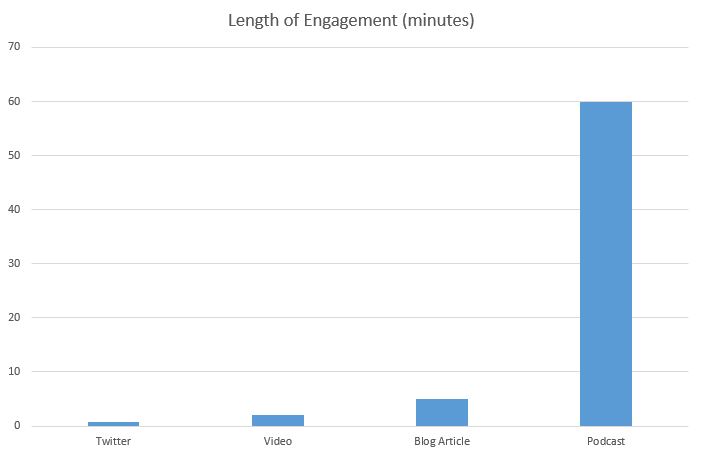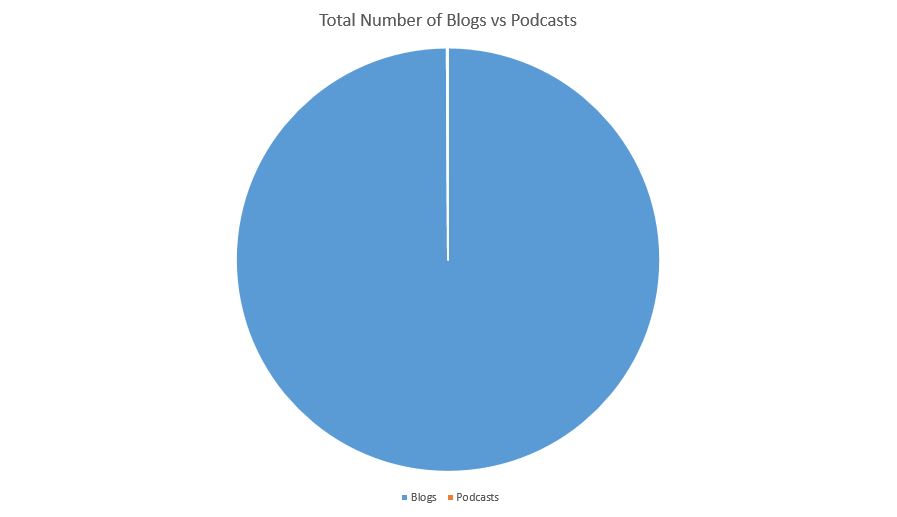I have been podcasting since late 2012 and have recorded almost 100 episodes since then between my programming business and the Coders’ Startup.
With almost 100 episodes recorded over the course of over two years, I have accumulated quite a bit of expertise and quite a bit of knowledge around podcasting as a platform.
When I take a look at my own numbers, I see that about 40% of my sales have come from organic traffic. This is the case because I tend to receive about 35,000 unique visits a month to my blog from organic Google traffic.
But what’s exciting is that the next biggest biggest “chunk” of my sales comes from podcasting. I know this because when people joined my core product (a video tutorial course) I asked them how they heard about me. After parsing through the data, about 35% of my sales come from podcasting.
When you compare my organic traffic numbers to my podcast listeners, there’s a HUGE gap. Sure my podcast receives around 30,000 downloads a month, but that’s across many episodes. So the number of actual listeners per month is FAR lower than the 35k organic Google visitors.
This means that when you break down my business, you’ll see that if you’re a podcast listener, you are WAY more likely to buy my products than if you heard about me from any other channel. That’s extremely powerful to know, and I want to talk about why that’s the case.
Shrinking Attention Spans
We’ve all heard the data about how we as humans have a shorter attention span than the average goldfish. A scary stat and it can be seen across all the different types of media.
Pulling from episode 64 of the smart passive income podcast, Pat Flynn talked to a room full of people about how long they typically stay engaged with content based on the platform.
Pat asked the group how long it takes to read a tweet. The answer? 5 seconds.
He then asked how long it takes to read a blog post, times ranged around 2-5 minutes.
How about videos? According to Wista you’ll lose half your audience after the 2 minute mark of a video. 2 Minutes!
We have such short attention spans it’s ridiculous, but what about a podcast? Do podcasts suffer from this same short attention span problem?
Well, Pat Flynn put that theory to the test with a room full of people, he asked the audience who had listened to a podcast longer than 5 seconds. About 90% of the room put their hands up.
Then he asked them to put their hands down if they hadn’t listened to a podcast longer than 2 minutes. Maybe 1% of the room put their hands down.
Okay, how about longer than 10 minutes. Few more people put their hands down.
Longer than 60 minutes? About 80% of the room STILL had their hands raised.
Let’s put that into a chart so we can see the dramatic different in engagement.

Hopefully the numbers speak for themselves and you can see why having a podcast is a smart decision for your company / brand.
Isn’t Podcasting a Crowded Market Now
So podcasting is growing rapidly and new podcasts are added into the iTunes and Stitcher libraries on a daily basis. This might lead you to believe that you “missed” the opportunity to start a podcast and capitalize on the market.
And you would be wrong.
As of April of 2013 (as reported by snitchim.com) there are currently over 240 million blogs in existence, with over 44 billion blog posts on the internet!
So then, how many podcasts are there? Thefutureofink.com reports this number to be around the 225,000 mark.
Again, for the sake of illustration, let’s go to the charts shall we:

As you can see, the number of podcasts vs blogs is so small, this pie chart can’t even show difference in scale properly!
Hands off Marketing with Podcasts
As coders, we sometimes fall short when it comes to properly marketing ourselves and our products. There’s no shame in it, we just weren’t raised in that kind of environment.
Another large “selling point” that podcasts have, is the fact that you tend to be able to grow your audience organically and much more quickly than if you were to start a blog.
Think about it, if you start a blog, you’re in competition with hundreds of millions of other people.
When you start a podcast, you have a growing marketing of podcast consumers who are trying to find a whole bunch of podcasts to listen to in a market that’s still a tiny fraction of the blogosphere.
That means that you’re going to grow your audience much faster with a podcast than if you were to just create a blog.
I equate this kind of “hand off marketing” to the kind of exposure you get when you publish an eBook on Amazon and leverage their free marketing offer (via the Kindle Select program)
Podcasting Tech
Starting a podcast is relatively inexpensive. You don’t need to get too crazy with podcasting gear to get a podcast that actually sounds very professional.
For example, I used to use an $80 USB condenser microphone with a $20 microphone desk stand and a $10 pop filter. So just over $100 in gear and I’m good to go.
However, I’d highly recommend you check out this Audio-Technica ATR2100-USB Cardioid Dynamic USB/XLR Microphone on Amazon. It’s about $60 and it is the BEST bang for your buck when it comes to microphones for podcasting. Seriously, it’s far better than my $80 mic.
These types of microphones are known as “condenser” microphones, which means that they tend to pic up all the noises around them. This can be both a good thing and a bad thing.
That bad news is that if you’ll be recording in a room that has hardwood floors, chances are the room will be echo-y and this would be a bad thing for a condenser mic. Or if you have noisy fans blowing or whatever, those sounds will come through.
On the plus side, having a mic that pics up all the noises means that you don’t HAVE to sit right in front of the microphone when you’re talking. It’s still recommended to be close to the mic for the best sound quality, but it’s not a requirement.
On the flip side, you could get a dynamic microphone like the Heil PR-40 Dynamic Studio Recording Microphone. This is the king of all podcasting microphones.
It costs significantly more, but sounds incredible and will not pick up the ambient noises of your room. If you go the route of this microphone though, it’s not a USB mic, so you’ll also need to pick up a mixer as well. After all is said and done, you’ll be looking to spend around $800 – $1000 in gear.
I would highly recommend sticking to the first option (condenser mic) for your first time podcasting. It’s far simpler to set up and you won’t be banging your head against the wall trying to get everything going for the first time.
I’d recommend you wait until you’ve got some podcasting experience under your belt before you venture into the “serious” hardware.
Podcasting Software
For recording audio and editing audio, there are great free programs out there that you can use. The most popular one is Audacity and it gets the job done when recording podcasts.
Having said that, finally after more than two years of podcasting I will be hiring an audio / video editor off of odesk or elance in the coming weeks so that I won’t have to deal with this stuff anymore. It’s not that the process isn’t enjoyable, it’s just that I’m realizing how much time it takes to do these tasks every week.
On that same point, I will also be hiring someone to write up these show notes, so in the future these blog posts / show notes will look different as it won’t be me typing them out. And this is a GOOD thing, as this episode is being released later than I anticipated as I was delayed in writing out these show notes (bad Trevor!)
How to Market your Podcast
Join communities that relate to your podcast and start interacting with them. Answer people’s questions wherever possible, participate in debates and just put yourself out there. BE a part of the communities!
Once you’ve built up a relationship with the communities you’ll be able to start having success with sharing your content.
Here’s a list of a few pinterest communities that we’d love for you to follow and interact inside of:
Podcasts and Blogs Worth Following
Business Blogging
Tech Articles and Blogs
Now Get It Done!
The time for learning is over, the time for action is now.
If you want to start a podcast, your first step is the buy the hardware. Make it a goal for yourself to buy the hardware within the next week.
Then while you’re waiting for the equipment to arrive, go check out some free tutorials on how to record a podcast with free tools.
If you have any questions or concerns about podcasts, then leave us a comment below!